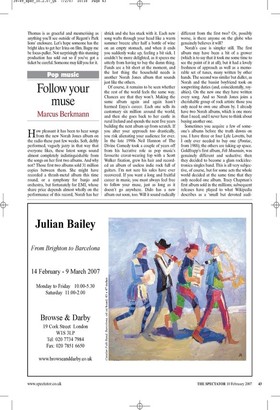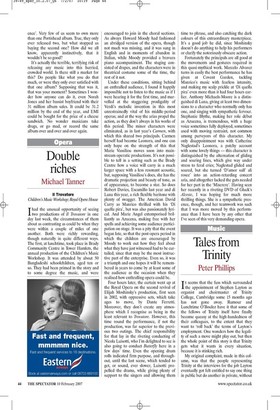Follow your muse
Marcus Berkmann How pleasant it has been to hear songs from the new Norah Jones album on the radio these past few weeks. Soft, deftly performed, vaguely jazzy in that way that everyone likes, these latest songs sound almost completely indistinguishable from the songs on her first two albums. And why not? Those first two albums sold 31 million copies between them. She might have recorded a thrash-metal album this time round, or a symphony for banjo and orchestra, but fortunately for EMI, whose share price depends almost wholly on the performance of this record, Norah has her shtick and she has stuck with it. Each new song wafts through your head like a warm summer breeze after half a bottle of wine on an empty stomach, and when it ends you suddenly wake up, feeling a bit sick. I couldn't be more delighted, as it spares me utterly from having to buy the damn thing. Funds are a bit short at the moment, and the last thing the household needs is another Norah Jones album that sounds just like the others.
Of course, it remains to be seen whether the rest of the world feels the same way. Chances are that they won't. Making the same album again and again hasn't harmed Enya's career. Each one sells its customary six million around the world, and then she goes back to her castle in rural Ireland and spends the next five years building the next album up from scratch. If you alter your approach too drastically, you risk alienating your audience for ever. In the late 1990s Neil Hannon of The Divine Comedy took a couple of years off from his lucrative role as pop music's favourite cravat-wearing fop with a Scott Walker fixation, grew his hair and recorded an album of useless indie rock full of guitars. I'm not sure his sales have ever recovered. If you want a long and fruitful career in music, you must always feel free to follow your muse, just as long as it doesn't go anywhere. Dido has a new album out soon, too. Will it sound radically different from the first two? Or, possibly worse, is there anyone on the globe who genuinely believes it will?
Norah's case is simpler still. The first album may have been a bit of a grower (which is to say that it took me some time to see the point of it at all), but it had a lovely freshness of approach as well as a memorable set of tunes, many written by other hands. The second was similar but duller, as Norah and the bassist boyfriend took on songwriting duties (and, coincidentally, royalties). On the new one they have written every song. And so Norah Jones joins a cherishable group of rock artists: those you only need to own one album by. I already have two Norah albums, which is one more than I need, and I never have to think about buying another one.
Sometimes you acquire a few of someone's albums before the truth dawns on you. I have three or four Lyle Lovetts, but I only ever needed to buy one (Pontiac, from 1988); the others are taking up space. Goldfrapp's first album, Felt Mountain, was genuinely different and seductive; then they decided to become a glam rock/electronica singles band. This is all very subjective, of course, but for some acts the whole world decided at the same time that they only needed one album. Tracy Chapman's first album sold in the millions; subsequent releases have played to what Wikipedia describes as a 'small but devoted audience'. Very few of us seem to own more than one Portishead album. True, they only ever released two, but what stopped us buying the second one? How did we all know, apparently instinctively, that it wouldn't be so good?
It's actually the terrible, terrifying risk of releasing any music into this hurried, crowded world. Is there still a market for this? Do people like what you do that much, or were they only ever satisfied with that one album? Supposing that was it, that was your moment? Sometimes I wonder how anyone can do it, even Norah Jones and her bassist boyfriend with their 31 million album sales. It could be 31.2 million by the end of the year, and EMI could be bought for the price of a cheese sandwich. No wonder musicians take drugs, or go mad, or record the same album over and over and over again.














































 Previous page
Previous page